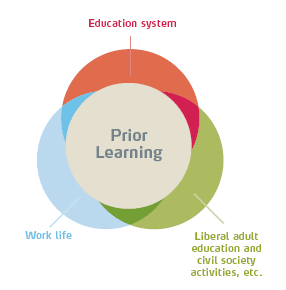 The VALIDATION and RECOGNITION of PRIOR NON-FORMAL and INFORMAL LEARNING (VPL) is a priority of EU educational policies and central to lifelong and life-wide learning. The aim is to strengthen the flexibility of learning pathways to increase labour market transition and mobility across Europe. Key objective is to enhance employability and labour market opportunities for disadvantaged individuals such as the low skilled, unemployed, migrant workers, refugees and individuals with restricted labour market and learning opportunities. Many different VPL initiatives at the national and European level have been taken and led to significant advancement of VPL in the last decade, particularly in terms of creating policy frameworks for VPL and piloting validation methods and procedures. Still, VPL in Europe presents a fragmented picture with some countries not yet having engaged in the process. To move from fragmentation to stronger coherence, common European principles for VPL have been formulated. This includes the European Councils’ recommendation of 20 December 2012, specifying that each EU-member state should have started to implement VPL processes by 2015.
The VALIDATION and RECOGNITION of PRIOR NON-FORMAL and INFORMAL LEARNING (VPL) is a priority of EU educational policies and central to lifelong and life-wide learning. The aim is to strengthen the flexibility of learning pathways to increase labour market transition and mobility across Europe. Key objective is to enhance employability and labour market opportunities for disadvantaged individuals such as the low skilled, unemployed, migrant workers, refugees and individuals with restricted labour market and learning opportunities. Many different VPL initiatives at the national and European level have been taken and led to significant advancement of VPL in the last decade, particularly in terms of creating policy frameworks for VPL and piloting validation methods and procedures. Still, VPL in Europe presents a fragmented picture with some countries not yet having engaged in the process. To move from fragmentation to stronger coherence, common European principles for VPL have been formulated. This includes the European Councils’ recommendation of 20 December 2012, specifying that each EU-member state should have started to implement VPL processes by 2015.
The project evaluates the advancement and effectiveness of VPL policies and practice in Denmark, Germany, Poland and Turkey considering how VPL initiatives benefit the individual. It assesses how the VPL procedures available have supported individuals’ labour market inclusion, employability and further learning pathways. Through introducing biographical perspectives into the validation process and identifying the role of employers for VPL, the project seeks to enhance the effectiveness of VPL practice. Outcomes on VPL effectiveness are continuously be channelled into the current VPL policy dialogue and on-going VPL activities. This is done by strengthening cooperation between regional and/or national VPL actors and multipliers and enhancing mutual learning for VPL across Europe. The project contributes to enhancing the transparency and recognition of skills and qualifications and facilitating labour market inclusion through access to training and qualifications for all through C-VET.
